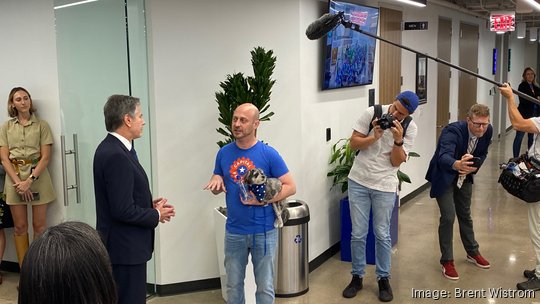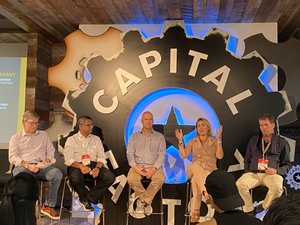
Austin startup accelerator Capital Factory, along with a consortium of business founders and investors, revealed a new plan Dec. 1 to better connect entrepreneurs statewide, as well as boost funding for startups by hundreds of millions in the coming years.
The concept, outlined in a new report with recommendations for Texas' largest cities, includes new initiatives to generate $600 million to $900 million in increased funding for startups by 2027. That would add to the state's roughly $8 billion in annual startup funding activity.
This could lead to an additional $3.6 billion to $5.4 billion in funding by 2030 if the plan is implemented and the resulting startups excel to unicorn or decacorn status, according to the report.
The new initiatives include the launch of a nonprofit called Station Texas that will connect startup founders and investors statewide through in-person events, invite-only WhatsApp groups in specific industry verticals, mentor networks and city-specific profile pages.
That's part of a broader effort to bring more national-scale organizations into the state to build atop organizations such as Army Futures Command in Austin and ARPA-H in Dallas.

Capital Factory's "The Texas Rising Tide" report calls for new efforts to brand Texas as a trailblazer in breakthrough, high-tech innovations and increase awareness of venture opportunities in defense technology, life sciences, generative AI and other emerging sectors.
"We see how the state's cities, each with its distinct strengths, are coming together to create a vibrant tapestry of innovation," Capital Factory co-founders Joshua Baer and Bryan Chambers wrote in the report. "This collaborative spirit is the driving force that will propel Texas into the future."
For Austin, often considered one of the nation's top tech hubs, the report calls for more robust partnerships with higher education and research institutions, as well as a technology innovation district that would "serve as the clear beacon for entrepreneurs in the city."
"We can’t rest on our laurels. Austin is no longer as affordable as it used to be. Big investments have been made into tech hubs across the state that need to translate into real economic impact," the report states.
Venture capital funding has declined nationwide following a spike in startup investments in 2021 and 2022 that saw many cities, including Austin, set new high water marks for venture funding flow. For example, Austin startups raised only $590 million across 78 deals in the third quarter of this year, which was the slowest quarter since the second quarter of 2019.
While that decline has brought Austin — and several other startup hubs — back to 2019 levels, venture funding remains far more robust now than it did just a decade ago.
For example, when Austin Ventures wound down its startup investing in 2015, local founders said they often were forced to fly to the Bay Area or East Coast to pitch their ideas to investors. But several venture firms, often founded by former Austin Ventures investors, quickly emerged to help build up a new era of startup funding in Austin and throughout Texas.
While the new initiatives are forward-looking, the 52-page document also details some of the state's most impactful founders and some of the projects that helped lay the groundwork for the state's startup growth.
It notes Texas' business-friendly, low-tax atmosphere, as well as highlighting founders including Michael Dell, Kendra Scott and Whitney Wolf Herd as major success stories. That includes the 1951 launch of Texas Instruments, George Kozmetsky's work at The University of Texas launching the IC2 Institute in 1977 and more recent milestones such as the 1987 launch of South By Southwest, the 2009 founding of Capital Factory and the launch of Army Futures Command in Austin in 2018.
Capital investments in Texas startups also boomed to about $8.9 billion in 2022, which is a 282% increase since 2017, according to the report. The state currently has more than 500 venture capital firms, which is a roughly 64% increase since 2012, the report states.

"While traditional industries such as oil and gas, transportation and logistics, and healthcare still hold significant positions in the Texas landscape, a new wave of audacious ideas is taking root in the state," it states. "Deep-tech sectors such as aerospace, robotics, artificial intelligence, climate and clean energy, and quantum technologies are emerging as key players within the ecosystem."
This isn't Capital Factory's first effort to better connect founders and investors across the state. The accelerator has forged deep ties in Dallas, Houston and San Antonio in recent years. For example, Capital Factory in 2019 filled two buses with investors, founders and reporters and went on a statewide tour to connect founders and highlight each city's strengths. It also published "The Texas Startup Manifesto" in 2017 and updated it again in 2021.
The new report also echos calls to help encourage more diverse founders to launch businesses and venture firms to make more investments in BIPOC- and women-led companies. It highlighted Austin's True Wealth Ventures, Diversity Fund and Artemis Fund as firms helping bring more funding and attention to women- and minority-led startups.
"Despite these significant steps forward, there is still room for Texas to grow in supporting women and minority-owned startups, as only 2% of funding in the U.S. today goes to women founders," the report stated. "In Texas, pioneers such as Sassie Duggleby, Julia Cheek, Joe Beard, Dennis Kale and others have shown Texans across the state what is possible; now it is up to us to support more individuals like them in order to truly take pride in Texas’ opportunity for all."






